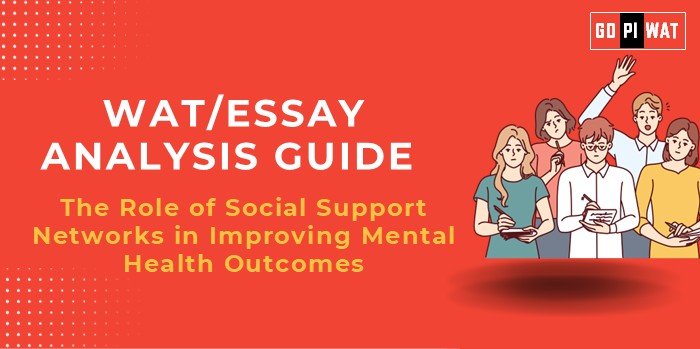📋 WAT/Essay Analysis Guide
🌐 The Role of Social Support Networks in Improving Mental Health Outcomes
💡 Understanding the Topic’s Importance
Social support networks are a cornerstone of mental health improvement. Their integration into global and local health strategies not only aids individuals but also reduces societal and economic burdens, making it a crucial topic for B-school perspectives.
📝 Effective Planning and Writing
- Time Allocation:
- Reading & Planning: 5 minutes.
- Writing: 20 minutes.
- Review: 5 minutes.
- Preparation Tips:
- Gather global and local statistics.
- Identify specific challenges, such as stigma and accessibility.
🎯 Introduction Techniques
- Contrast Introduction:
“While developed nations are integrating social networks into mental health care, low-income countries still grapple with stigma and lack of access, highlighting the critical yet uneven role of these networks.”
- Solution-Based Introduction:
“From reducing depression by 48% to enhancing recovery rates, social support networks offer scalable solutions to the global mental health crisis.”
📚 Structuring the Essay Body
- Achievements: Data-driven successes of social networks in reducing mental health issues.
- Challenges: Stigma, training deficits, and access disparities.
- Future Outlook: Recommendations like integrating technology, policy changes, and public-private partnerships.
📄 Concluding Effectively
- Balanced Conclusion:
“Social support networks are indispensable in improving mental health outcomes, but their success relies on systematic professional integration and reducing societal stigma.”
- Comparative Conclusion:
“Countries like Japan and Kenya show how innovative integration of social networks can transform mental health care. The global challenge lies in scalability and inclusivity.”
📊 Recommendations for Sustainable Progress
- Increase training for community-led groups.
- Develop digital platforms for remote support.
- Strengthen public-private collaborations.
✨ Sample Short Essays
Balanced Perspective (100 words):
Social support networks play a critical role in improving mental health by offering emotional and practical support. Programs in Kenya and Kerala demonstrate their impact in reducing recovery times and enhancing community resilience. However, these networks often face challenges, such as lack of formal training and cultural stigma. A balanced approach, integrating community networks with professional healthcare services, is essential for sustainable progress.
Solution-Oriented (100 words):
The success of social support networks in mental health care lies in their ability to address emotional and logistical needs. To maximize their potential, governments must invest in training and funding grassroots organizations while fostering collaboration with formal healthcare systems. Additionally, digital tools can bridge access gaps, as seen in Japan’s tech-integrated approaches. Addressing these challenges can significantly enhance global mental health outcomes.
Global Comparison (100 words):
Countries like Australia and Kenya illustrate the power of social networks in mental health care. Australia’s ‘Beyond Blue’ campaign integrates these networks into systemic care, while Kenya’s grassroots programs have improved recovery rates by 60%. In contrast, countries with less emphasis on such networks face greater mental health challenges. A global focus on strengthening social support networks can transform the future of mental health care.


